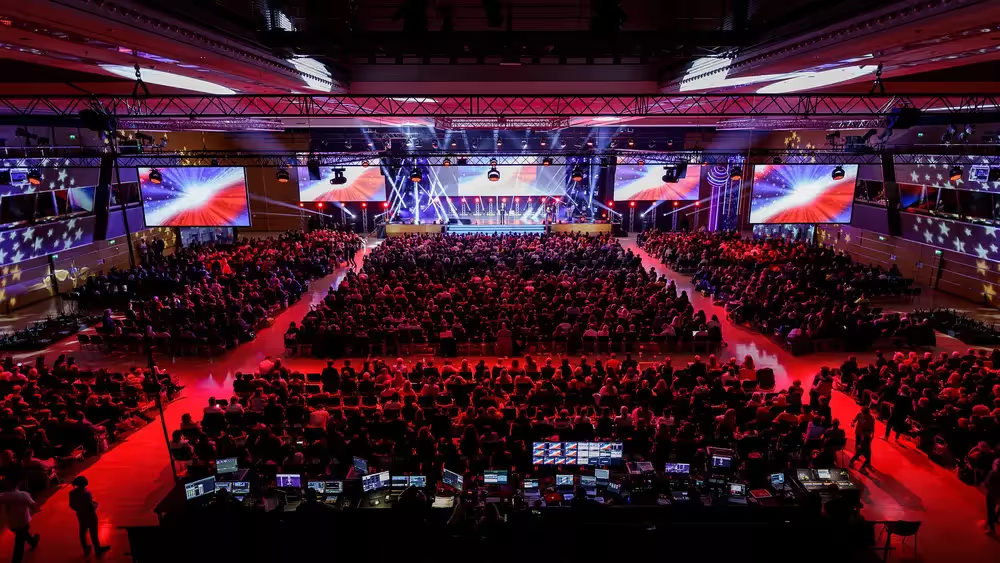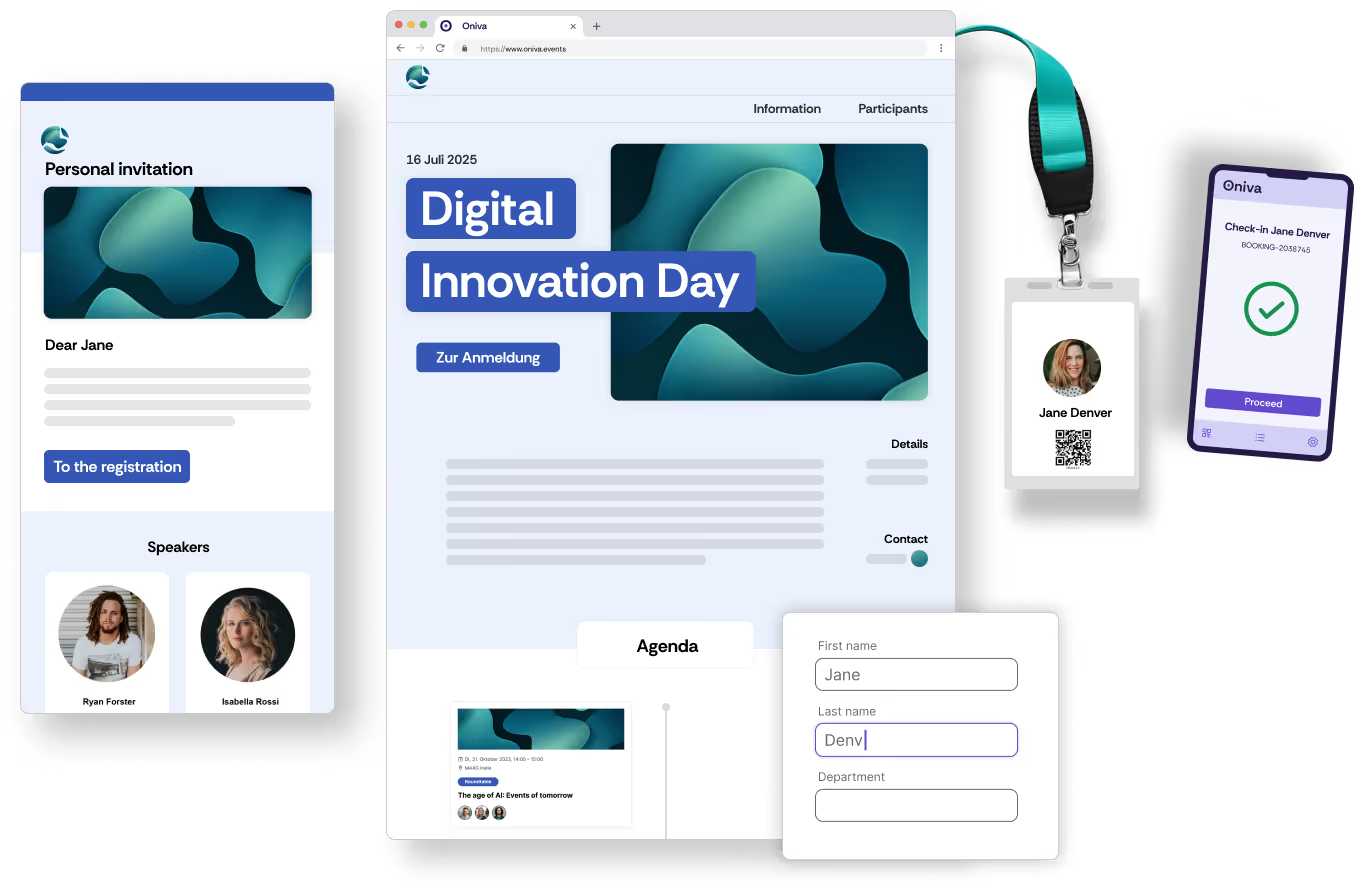What exactly counts as an event?
The term ‘event’ encompasses all types of gatherings. By definition, an event is an organised, purpose-driven, time-limited occurrence attended by a group of people, either in person or digitally (source). This definition already hints that events are not limited to the traditional sense but generally include any occurrence tied to a specific point in time.
What types of events are organised in large enterprises?
From a holistic perspective, the range of events organised in large enterprises is extremely broad. Naturally, the types of events vary depending on the industry and company structure. The following overview shows typical event formats that are part of everyday life in many large organisations:
💼 Internal events
These formats foster communication, culture, and knowledge exchange within the company:
- Townhalls / Staff meetings
- Department meetings and strategy days
- Leadership retreats
- Onboarding events for new employees
- Staff training and development programmes
- Anniversary and team events
- Project kick-offs
- Change management workshops
🤝 External B2B events
Here the focus is on relationship-building and brand positioning:
- Customer events
- Partner days and distributor events
- Roadshows and sales events
- Trade fairs and conferences
- Product launches and press events
- VIP events and exclusive invitation-only formats
🌍 Hybrid & digital events
Digital and hybrid formats extend reach and improve efficiency:
- Webinars and online training sessions
- Virtual customer events
- Hybrid conferences and summits
- Digital showcases and in-house exhibitions
🎓 Corporate learning & development
These events support employee growth and development:
- Training series and learning modules
- Talent programmes and young professional days
- Certification events
- Knowledge-sharing formats such as innovation days
🎉 Representative & brand-building events
These events enhance identity and public perception:
- Corporate galas and awards ceremonies
- Site openings and anniversaries
- CSR days and volunteering events
- Sponsorship and brand activations
The list could go on – it highlights just how varied and complex events in large organisations can be. This variety also shows that a holistic view is necessary, as these events are organised by different departments.
What challenges arise in event management for large enterprises?
In many organisations, event management has evolved organically – with a variety of tools, processes, and responsibilities. Especially in decentralised environments, the following challenges arise:
- Lack of central overview of all event activities. Where and how is the organisation effective, internally and externally?
- Fragmented software solutions and data silos, decentralised data storage.
- Inconsistent external presentation due to non-compliance with CI/CD and communication standards.
- Unclear responsibilities and inefficient event processes.
- High coordination effort with IT, non-compliance with data protection regulations.
- Lack of shared learning culture for improving event management.
Ultimately, these issues lead to increased overall costs for large organisations – often not immediately visible, as they mainly relate to personnel efforts that are not measured in detail.
What is meant by a scalable event management platform?
A scalable event management platform is a central, cloud-based solution that enables organisations to efficiently manage all event processes – regardless of event type, location, or organiser. Scaling not only refers to handling higher volumes but also to standardised workflows despite decentralised usage, automation of repetitive event processes, compliance and data protection control, corporate design governance, and a unified data base for measurable results. The result: direct cost savings through greater efficiency and reduced staffing needs.
Core components of a scalable event management platform for large enterprises
For a platform to be truly scalable in large organisations, it must meet the following requirements:
- High flexibility to support various event types and formats
- Automation of core processes such as invitations, reminders, and check-ins
- Central management of design, language, data protection, and sender information
- Global time zones and formatting settings
- Pre-configured templates and smart defaults for rapid event creation
- High performance even during simultaneous events with large numbers of attendees
- Granular permission management for departments and roles
- Seamless integration with systems such as SSO, CRM, intranet, etc.
- Compliance with security and data protection standards (e.g., GDPR)
- Intuitive usability for occasional users
- Flexible and transparent licensing models based on usage or department
What are the specific benefits of a scalable event platform?
Implementing an event management platform in large enterprises brings measurable benefits:
- Cost savings through automated processes and reduced tool variety
- Central control over design, data protection, communications, and event data
- Improved public image through professional and consistent presentation
- More effective control through centralised evaluations and feedback loops
- Faster learning through reusable templates and best practices
Cost savings in particular should not be underestimated. According to Oniva’s calculations, up to 80% of manual effort can be reduced through automated event management. You can find more about this in our blog post.
Challenges in implementing a scalable event platform
Introducing a scalable event management platform can come with challenges. In large organisations, differing requirements across departments or countries can complicate harmonisation. There's a risk that too many special requests will result in an overly complex requirements list that delays implementation. There’s also the considerable coordination effort and the need to clearly define cost allocation when usage is decentralised. Change management is also critical: people must not only be trained but actively informed about the new possibilities so that the platform is accepted and used effectively.
How can a successful implementation be achieved?
To implement an event management platform successfully, it is advisable to take an incremental, agile approach. For example, run a single event using the platform to test its practical application. Alternatively, begin with a prioritised event type as a pilot project. This enables early insights and a low-risk introduction.
From the outset, key departments and so-called power users should be involved. They contribute to practical platform design and later serve as internal multipliers.
Implementation can follow an iterative process – in phases, by region, or by department. This allows for continuous learning and quick adjustments without burdening the entire organisation at once.
A well-thought-out training concept is also essential – including basic training for new users and advanced sessions for experienced users and key roles.
Go-live is not the end of the journey: user feedback and clearly defined KPIs enable ongoing optimisation of the platform, ensuring it evolves with the organisation’s needs.
What does Oniva offer for large enterprises?
Initially developed for Swisscom (Switzerland’s largest telecom provider), Oniva was specifically designed to meet the complex needs of large organisations. In addition to its core event management features, Oniva offers the following advantages for efficient enterprise-scale event operations:
✅ Easy-to-use, flexible platform for all event types
✅ Private cloud hosting in Switzerland for maximum security and performance
✅ Standard integrations such as SSO, Active Directory, custom interfaces, and mail server integration
✅ Comprehensive permission management for various roles and departments
✅ Workspaces for structured organisation by department or event type
✅ Pre-configured settings and event templates for fast creation
✅ Branding integration for consistent CI/CD implementation
✅ SLA-based premium support with a dedicated contact person
✅ Training, onboarding, and professional guidance
Whether managing 10 or 1,000 events per year – thanks to custom configuration and a flexible pricing model, Oniva provides the foundation for truly scalable enterprise-level event management.



















.svg)















































































